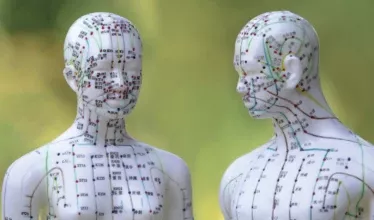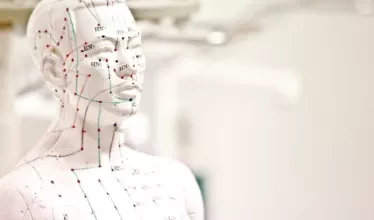
NDMU SOIH offers four master’s and doctoral programs in acupuncture and herbal medicine: Doctor of Acupuncture, Doctor of Acupuncture with a Chinese Herbal Medicine Specialization, Master of Acupuncture, and Master of Acupuncture with a Chinese Herbal Medicine Specialization. All four programs prepare students to achieve full clinical competency in acupuncture and to become highly skilled, integrative acupuncturists. Each program has unique characteristics that prepare students for different career tracks and aspirations.
All of NDMU SOIH's master’s and doctoral programs in acupuncture and herbal medicine blend acupuncture approaches from two healing traditions, Constitutional Five Element Acupuncture (CFEA) and Traditional Chinese Medicine (TCM), with contemporary science as the basis for treating the whole person. The programs provide a comprehensive understanding of the classical and theoretical foundations of the field of acupuncture and introduce students to biomedicine from an integrative and holistic perspective. They emphasize self-cultivation and healership through a curriculum that is rigorous, transformative, and relationship centered. By drawing upon ancient wisdom and the gifts of nature students will learn to choose their words and actions intentionally in order to be a healing presence that supports their patients. These programs develop highly skillful and compassionate practitioners who offer acupuncture as a catalyst for healing and wellness, as well as for increased self-awareness and personal transformation. Additionally, the programs provide a solid foundation in career development, practice management, and the business skills necessary to build a practice or enter the workforce and participate in today’s growing healthcare field.
All four programs share these highlights:
- A rigorous clinical experience beginning as early as the second trimester.
- The only accredited graduate program to offer the National Acupuncture Detoxification Association (NADA) training and related clinical experience as part of the curriculum.
- The opportunity to work with a wide variety of clinical supervisors with different theoretical perspectives and practice styles.
- Exposure to different clinical approaches such as: Chinese and Western nutrition therapy, qi gong, cupping, gua sha, moxibustion, scalp acupuncture, electro-acupuncture, and tuina.
- The opportunity to see patients from diverse backgrounds and in community outreach settings.
- The opportunity to engage in specialty courses in the treatment of certain health conditions and populations, including pain management and women’s health.
- Flexible, full-time formats: two days each week, with some online courses, and occasional intensives and self-scheduled electives offered outside of the two-day schedule.
- A cohort learning format that provides mentorship and flexibility for students to learn in small groups and in one-on-one settings during clinical rotation.

The Doctor of Acupuncture with a Chinese Herbal Medicine Specialization degree integrates the Doctor of Acupuncture curriculum with a deep concentration in the study of Chinese Herbs and prepares graduates to meet the growing need and opportunities for well-trained Chinese medical practitioners to serve in numerous types of integrative medicine settings across the country. It prepares students to be integrative practitioners who can seamlessly weave acupuncture and Chinese herbs into clinical treatment plans, and bring their research literacy, advanced diagnostic studies, systems-based medicine skills and knowledge to bear in a multitude of clinical environments, including integrative healthcare settings alongside practitioners in allopathic and other complementary health fields. As a graduate of this program, you will be recognized as a doctor, both professionally and publicly, and will be prepared to work as a vital part of multidisciplinary healthcare team.
The Doctor of Acupuncture with a Chinese Herbal Medicine Specialization program has the following specific characteristics in addition to the highlights shared by all programs:
- A curriculum consisting of 190.25 credits that can be completed in four years (13 consecutive trimesters).
- Foundational clinical acupuncture experience consisting of 30 observations, 125 primary treatments, 125 secondary treatments, and 23 community health initiative treatments.
- Advanced clinical acupuncture experience consisting of 120 hours of evidence informed treatment, integrative clinic, or integrative case discussions.
- Clinical Chinese herb experience consisting of 40 primary treatments and 65 secondary treatments.
- The opportunity to gain practical experience in prescribing Chinese herbs, and the management of a Chinese herbal dispensary.
- The opportunity to experience integrative practices in at least one of several possible conventional healthcare settings.
- The opportunity to enhance and deepen one’s practice by sharpening diagnostic skills and additional specialization to confidently treat specific populations.
Learning Outcomes: Students who complete the program will be able to:
- Demonstrate a comprehensive knowledge of the history and foundational theories of acupuncture and its different traditions.
- Demonstrate a comprehensive knowledge of the tradition of Constitutional Five Element Acupuncture, Eight Principle treatment strategies and its different traditions.
- Demonstrate a comprehensive knowledge of Chinese Herbs from a unique integration of Constitutional Five Element perspectives, classical Chinese medicine, Eight Principle diagnosis, and Zang-Fu differentiation.
- Express an understanding of the biomedical theories of health and disease relevant to the practice of acupuncture and herbal medicine.
- Demonstrate effective communication with a wide variety of professional colleagues.
- Develop a healing presence both personally and professionally that will facilitate growth as a practitioner.
- Develop specialization in the treatment of certain health conditions and populations.
- Demonstrate support of clients at all levels of being – body, mind, and spirit.
- Understand the business and practice management skills that will ensure success in the workforce.
- Develop a collaborative approach to health care.
- Be an effective clinician/educator in an integrative care setting.
- Be able to communicate effectively with other health care providers regarding the results of diagnostic studies.
- Understand research and scholarship in the field of health and wellness.
Curriculum: See the Academic Catalog for a description of the required curriculum.

The Doctor of Acupuncture program is designed to educate and develop graduates to meet the growing need and opportunities for well-trained Chinese medical practitioners to serve in numerous types of integrative medicine settings across the country. It builds on the outcomes and competencies of the Master of Acupuncture toward achieving full clinical competency, with the addition of 28 doctoral-specific competencies in the domains of research literacy, advanced diagnostic studies, systems-based medicine, and professional development, along with an enhanced clinical training. The program prepares graduates to work in a multitude of clinical environments, including integrative healthcare settings alongside practitioners in allopathic and other complementary health fields. As a graduate of this program, you will be recognized as a doctor, both professionally and publicly, and will be prepared to work as a vital part of multidisciplinary healthcare team.
The Doctor of Acupuncture program has the following specific characteristics, in addition to the above highlights shared by all programs:
- A curriculum consisting of 150.25 credits that can be completed in four years (13 consecutive trimesters).
- Foundational clinical acupuncture experience consisting of 30 observations, 125 primary treatments, 125 secondary treatments, and 23 community health initiative treatments.
- Advanced clinical acupuncture experience consisting of 120 hours of evidence informed treatment, integrative clinic, or integrative case discussions.
- The opportunity to experience integrative practices in at least one of several possible conventional healthcare settings.
- The opportunity to enhance and deepen one’s practice by sharpening diagnostic skills and additional specialization to confidently treat specific populations.
Students who complete the program will be able to:
- Demonstrate a comprehensive knowledge of the history and foundational theories of acupuncture and its different traditions.
- Demonstrate a comprehensive knowledge of the tradition of Constitutional Five Element Acupuncture, Eight Principle treatment strategies and its different traditions.
- Express an understanding of the biomedical theories of health and disease relevant to the practice of acupuncture and herbal medicine.
- Demonstrate effective communication with a wide variety of professional colleagues.
- Develop a healing presence both personally and professionally that will facilitate growth as a practitioner.
- Develop specialization in the treatment of certain health conditions and populations.
- Demonstrate support of clients at all levels of being – body, mind, and spirit.
- Understand business and practice management skills that will ensure success in the workforce.
- Develop a collaborative approach to health care.
- Be an effective clinician/educator in an integrative care setting.
- Be able to communicate effectively with other health care providers regarding the results of diagnostic studies.
- Understand research and scholarship in the field of health and wellness.
Curriculum: See the Academic Catalog for a description of the required curriculum.

The doctoral completion programs in acupuncture provide a pathway for alumni of NDMU SOIH's Master’s level acupuncture programs to earn the Doctor of Acupuncture or Doctor of Acupuncture with a Chinese Herbal Medicine specialization.
See the Doctor of Acupuncture with a Chinese Herbal Medicine Specialization and Doctor of Acupuncture sections above for the description of program features and learning outcomes.
Curriculum: See the Academic Catalog for a description of the required curriculum.

The Master of Acupuncture with a Chinese Herbal Medicine Specialization combines the skills and knowledge of acupuncture provided in the Master of Acupuncture degree with a deep concentration and practice in Chinese herbs. The program further enhances and deepens a graduate’s ability to treat the whole person with a multi-disciplinary knowledge base and clinical acumen. It prepares students to become a licensed acupuncturist who can integrate and apply the benefits of both acupuncture and Chinese herbs in cultivating health and wellness.
The Master of Acupuncture with a Chinese Herbal Medicine Specialization program has the following specific characteristics, in addition to the above highlights shared by all programs:
- A curriculum consisting of 168.25 credits that can be completed in four years (13 consecutive trimesters).
- Clinical acupuncture experience consisting of 30 observations, 125 primary treatments, 125 secondary treatments, and 23 community health initiative treatments.
- Clinical Chinese herb experience consisting of 40 primary treatments and 65 secondary treatments.
- The opportunity to gain practical experience in prescribing Chinese herbs, and the management of a Chinese herbal dispensary.
Students who complete the program will be able to:
- Demonstrate a comprehensive knowledge of the history and foundational theories of acupuncture and its different traditions.
- Demonstrate a comprehensive knowledge of the tradition of Constitutional Five Element Acupuncture and Eight Principle treatment strategies.
- Demonstrate a comprehensive knowledge of Chinese Herbs from a unique integration of Constitutional Five Element perspectives, classical Chinese medicine, Eight Principle diagnosis, and Zang-Fu differentiation.
- Express an understanding of the biomedical theories of health and disease relevant to the practice of acupuncture and herbal medicine.
- Demonstrate effective communication with a wide variety of professional colleagues.
- Develop a healing presence both personally and professionally that will facilitate growth as a practitioner.
- Develop specialization in the treatment of certain health conditions and populations.
- Demonstrate support of clients at all levels of being – body, mind, and spirit.
- Understand the business and practice management skills that will ensure success in the workforce.
Curriculum: See the Academic Catalog for a description of the required curriculum.

The Master of Acupuncture (MAC) program was the first accredited master’s degree program in acupuncture in the United States (1981) and continues to provide students with a comprehensive curriculum combining rigorous classroom teaching and a rich clinical experience. This program provides students with the fundamental skills and knowledge to become a licensed acupuncturist in various settings, especially private and small group practices.
The Master of Acupuncture program has the following specific characteristics, in addition to the above highlights shared by all programs:
- A curriculum consisting of 128.25 credits that can be completed in three years (9 consecutive trimesters).
- Clinical acupuncture experience consisting of 30 observations, 125 primary treatments, 125 secondary treatments, and 23 community health initiative treatments.
Students who complete the program will be able to:
- Demonstrate a comprehensive knowledge of the history and foundational theories of acupuncture and its different traditions.
- Demonstrate a comprehensive knowledge of the tradition of Constitutional Five Element Acupuncture and Eight Principle treatment strategies.
- Express an understanding of the biomedical theories of health and disease relevant to the practice of acupuncture and herbal medicine.
- Demonstrate effective communication with a wide variety of professional colleagues.
- Develop a healing presence both personally and professionally that will facilitate growth as a practitioner.
- Develop specialization in the treatment of certain health conditions and populations.
- Demonstrate support of clients at all levels of being – body, mind, and spirit.
- Understand the business and practice management skills that will ensure success in the workforce.
Curriculum: See the Academic Catalog for a description of the required curriculum.

The Post-Baccalaureate Certificate in Chinese Herbal Medicine is unique in the U.S. for integration of Constitutional Five-Element perspectives, classical Chinese medicine, Eight-Principle diagnosis, and Zang-Fu pattern differentiation. The program provides a deep and thorough understanding of Chinese herbs and formulas and applies them to the practical enhancement of health and wellness. It is rooted in the history of ideas of Chinese herbal medicine from the classics to contemporary practice. Graduates are confident in their ability to be effective and knowledgeable practitioners of Chinese herbal medicine. This program is designed for licensed acupuncturists, and its flexible weekend format is tailored to their needs. This 41-credit program is delivered on-campus and can be completed in 6 trimesters (2 years).
The Post-Baccalaureate Certificate in Chinese Herbal Medicine at NDMU SOIH educates effective clinicians with a deep and thorough understanding of Chinese herbs and formulas who apply them to the practical enhancement of health and wellness and integrate their use with acupuncture approaches. The course of study integrates classical Chinese medicine and Constitutional Five-Element constitutional perspectives into the study of herbal medicine, yielding a uniquely deep and broad vision of the Chinese tradition. Graduates possess a well-rounded knowledge of the theory and philosophy of Chinese herbal medicine, its rich history, and contemporary applications. The program provides a deep and thorough understanding of Chinese herbs and formulas in the didactic component. Clinical training includes direct diagnostic calibration with experienced supervisors and practical dispensary training in NDMU’s extensive herbal dispensary. The program provides the opportunity to gain practical experience in prescribing Chinese herbs as well as the management of a Chinese herbal dispensary. It also provides the opportunity to apply the use of Chinese herbs to specialty topics, including gynecology, dermatology, oncology, gastroenterology, and traumatology. Students, taught by some of the brightest clinicians and prominent elders of Chinese herbal medicine in the U.S., receive knowledge and wisdom that carries the Chinese herbal tradition forward into an increasingly prominent place in the current healthcare landscape. Faculty in the program are highly credentialed faculty, and many hold the highest professional credential in acupuncture and herbal medicine in the U.S., issued by the National Certification Commission for Acupuncture and Oriental Medicine (NCCAOM).
Students who complete the Post-Baccalaureate Certificate in Chinese Herbal Medicine are able to:
- Demonstrate a comprehensive knowledge of the foundational theories in Chinese herbal medicine formulas
- Apply a theoretical framework to analyze medicinal substances (herbal, mineral and animal).
- Analyze medical conditions and provide a differential diagnosis using theoretical frameworks presented in the program.
- Demonstrate a knowledge of various specialties of Chinese medicine and their theories and contributions.
- Demonstrate broad-based knowledge of the history of Chinese medicine
- Acquire a working understanding of Chinese dietary therapy.
- Obtain the clinical skills and training (diagnosis, formula planning, treatment delivery and patient management) necessary to become a practicing Chinese herbalist.
Curriculum: See the Academic Catalog for a description of the required curriculum.
Licensure, Certification, & Credentialing
Laws & Licensure
Completion of the Doctor of Acupuncture with a Chinese Herbal Medicine Specialization program does not automatically qualify graduates to begin practicing independently. Each state, including Maryland, has specific licensure or registration procedures that must be met. Governmental laws, regulations, legal opinions, and requirements differ from country to country and state to state. NDMU SOIH cannot provide assurance that completion of the program will qualify a graduate to be registered or accepted under a state law other than Maryland. However, the University’s Doctor of Acupuncture with a Chinese Herbal Medicine Specialization program is designed to provide basic, solid competence in traditional acupuncture. There may be a waiting period between the completion of the program and the legal recognition allowing the graduate to begin practice. Until a graduate receives official notification of legal recognition to begin practice, she or he may continue to practice only under faculty supervision. Most states require successful completion of the National Certification Commission for Acupuncture and Oriental Medicine exam. For more information, refer to nccaom.org.
Maryland Acupuncture Licenses
Graduates wishing to practice in Maryland may be licensed by applying to the Maryland Board of Acupuncture. NDMU SOIH is approved by the Maryland Higher Education Commission to award a Doctor of Acupuncture with a Chinese Herbal Medicine Specialization degree, and the program conforms to Maryland laws and regulations regarding the practice of acupuncture. For requirements for licensure in Maryland, contact: Maryland Board of Acupuncture, 4201 Patterson Avenue, Room 311 Baltimore, MD 21215; phone 410-764-4766 or 800-530-2481; or online at health.maryland.gov/bacc/.
Requirements of Other States
For eligibility to apply for licensure, other states may stipulate additional requirements, such as completion of a course in Chinese herbs or clinical hours beyond what is required by NDMU SOIH. Individuals who wish to practice in a state other than Maryland are advised to check the licensing requirements of that state by contacting the medical or acupuncture regulating agency in each state.
Additional Information
Additional information regarding licensure is available in the State Licensure Determination document on the Student Consumer Information webpage and in the Academic Catalog.
Program Accreditation & Approvals
Accreditation Commission for Acupuncture and Herbal Medicine (ACAHM)
The following programs offered by Notre Dame of Maryland University are accredited by the Accreditation Commission for Acupuncture and Herbal Medicine (ACAHM):
- Master of Acupuncture
- Master of Acupuncture with a Chinese herbal medicine specialization
- Doctor of Acupuncture
- including a Doctor of Acupuncture degree completion track
The programs listed above may offer courses via distance education.
ACAHM does not accredit any programs at the undergraduate/bachelor level.
Notre Dame University of Maryland is executing a voluntary teach-out of all ACAHM-accredited programs formerly offered by Maryland University of Integrative Health. No new students are being enrolled into these programs. The programs retain accredited status until conclusion of the teach-out.
Accreditation status and notes may be viewed on the ACAHM Directory.
ACAHM is recognized by the United States Department of Education as the specialized accreditation agency for institutions/programs preparing acupuncture practitioners. ACAHM is located at 500 Lake Street, Suite 204, Excelsior, Minnesota 55331; phone 952/212-2434; https://acahm.org.
Public Disclosure Statement Effective as of 11 September 2025.


